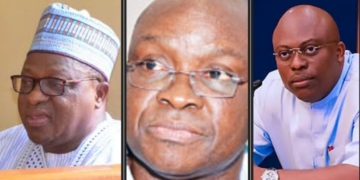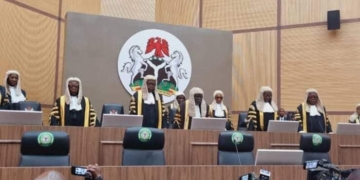On May 26th, the federal government filed a case at the Supreme Court against the 36 state governments seeking the enforcement of full autonomy for local governments in Nigeria. Before now, state governments determined the major activities of the 774 local governments, raising concerns about the need for independence for the third tier of government.
On July 11th, the apex court directed that financial allocations meant for running all 774 local government areas in the country be paid to them directly. The court stated that state governments have no right to keep and manage allocations on behalf of local governments, a practice the court deemed unconstitutional.
“The Supreme Court of Nigeria’s decision to send funds directly to Local Government Areas (LGAs) marks a significant shift towards financial autonomy for local governments. This ruling eliminates the intermediary role of State Governments, reducing political interference and ensuring that LGAs receive their full allocations,” said Alalafia Qudus, a law expert.
Qudus maintained that the Supreme Court ruling is in line with the 1999 constitution (as amended) and that the Nigerian Constitution provides for each tier of government’s financial independence, particularly emphasizing local governments’ autonomy.
“The position of the Supreme Court of Nigeria to grant our Local Governments their full autonomy is in line with the dictate of the law. In this instance, it is the constitution of the Federal Republic of Nigeria. The Supreme Court, as well as other courts, is the custodian of the Constitution. And it is the duty of this Court as the final court to interpret the provisions of the Constitution and other enacted statutes for the proper conduct of affairs so that democratic governance will be predicated and sustained on the rule of law. See the authority of DINGYADI & ANOR v. INEC & ORS (2011) LPELR-950(SC).
“Section 2 of the constitution states that Nigeria is one indivisible and indissoluble Sovereign State to be known by the name of the Federal Republic of Nigeria and shall be a Federation consisting of States and a Federal Capital Territory. It states further under Section 3 Subsection 6 that there shall be seven hundred and sixty-eight local government areas in Nigeria as shown in the second column of Part I of the First Schedule to the Constitution and six area councils as shown in Part II of that Schedule.
“Now, having established that local governments are, by law, independent, there should be no debate about whether or not they are meant to be financially independent because the constitution does not approbate and reprobate in this instance. Take, for example, section 7 (6) which provides that subject to the provisions of the Constitution, the National Assembly shall make provisions for statutory allocation of public revenue to local government councils in the Federation; and also, the House of Assembly of a State shall make provisions for statutory allocation of public revenue to local government councils within the State.
“Let me state at this juncture that I am not unaware of the provision of section 162 which many have misconstrued to mean that states are meant to apply local government funds on their behalf. This position is false and fallacious and it is against the dictate of the law. It is settled that provisions of statutes and the constitution are construed conjunctively and must be read as a whole and not in isolation. See A.G FEDERATION V ABUBAKAR (2007) 10 N WLR (Pt. 1041) 1,” he said.
However, Victor Ayeni, a senior law lecturer at Adekunle Ajasin University (AAUA), gave a counter opinion, noting that the constitution does not grant autonomy to local governments. According to him, the Supreme Court discovered that the money does not get to the local governments, so in giving a compulsory interpretation, the Supreme Court had to rechannel the money. “Even though the clear provision of the constitution is that the money ought to have gone to the state, which would then further distribute the money to the local governments.”
“The Supreme Court attempted to follow, in interpreting section 7 and section 162, the Supreme Court answered the question by saying that section 7 and section 162 of the constitution says that the constitution intends that the money which is channeled through the state account ought to get to the local government eventually.
“The Supreme Court had to rechannel the money even though the clear provision of the constitution is that the money ought to have gone to the state, and the state would then further distribute the money to local governments. But the state, which is a trustee of the money, is guilty of abuse of the trust funds. If the trustee is guilty of an abuse of the trust funds, there is nothing wrong if the trust fund is made available to the beneficiary, in this case, the local government. So that is exactly what the Supreme Court has done.
“So there is no financial autonomy, but the Supreme Court made this interpretation because it felt the state has failed in its responsibility to make the allocations placed in their trust to further distribute them down the line. So it is actually a remedial decision, a decision aimed at remedying the problem, a decision aimed at solving the problem. So, assuming the state had lived up to their expectations, they would never have a need for money to be allocated directly to local governments,” he said.
Despite Autonomy Challenges Will Persist
Political interference from State Governments often compromises the financial autonomy of local governments, said Qudus, adding that “State authorities may manipulate the allocation and utilization of funds meant for local councils, thereby undermining their independence and operational capacity.”
Qudus maintained that the lack of accountability and transparency in the management of funds at all levels of government poses a significant challenge as corruption, embezzlement, and misappropriation of funds intended for local governments can reduce the resources available for development projects and public services.
“Without stringent measures to ensure transparent and accountable financial management, the effectiveness of the financial framework remains compromised. The over-reliance on federal allocations makes local governments vulnerable to fluctuations in national revenue and federal budgetary constraints. This dependence limits their financial stability and sustainability, particularly during economic downturns. Diversifying revenue sources and enhancing local revenue generation are vital to reducing this dependency,” added Alalafia.
Reacting to how the local government will deal with political pressure to maintain their autonomy, Ayeni said it requires synergy and collaboration. According to him, it is left to the federal government, starting with the attorney general of the federation, the accountant general of the federation, and other federal government agencies to step in and ensure that state governors keep to the decision of the Supreme Court.
He emphasized that only local governments that have democratically elected chairmen and councilors should get the money from the federation account.
He stressed that to achieve this, international and civil society organizations should pay close attention to the process of electing councilors and chairmen at various levels in Nigeria.
“It is very important to ensure that the governors do not have overriding control over who becomes governor, who becomes chairmen, and who becomes councilors. Also, the responsibility is on the local government to ensure that it does not abuse the trust that has been placed in it, now that money will go directly from the federation account to the local government. We are waiting to see what chairmen will do with it, if this will become an era where chairmen will begin to buy houses in London, and all over the world.
“Then it will now mean that what the Supreme Court has done has not taken us out of the ditch where we have been. So the point has to be made and it has to be made sufficiently clear that there is no good in making local government get money directly from the federation account, if chairmen of local government councils are going to embezzle the money. So we are watching out to see what local government chairmen are going to do with the money that is being sent to them.
He called for local government leaders to be educated on the purpose of the autonomy granted by the Supreme Court.
“Autonomy is not an absolute good, if the local government channel is going to abuse the autonomy then what good is the autonomy? So I think we need to educate chairmen of local governments that the purpose of the autonomy they have been granted is to do good to their community and to ensure that the mismanagement we are trying to fight, which is the embezzlement of state resources, does not repeat itself under their watchful eyes,” Ayeni said.





Discussion about this post